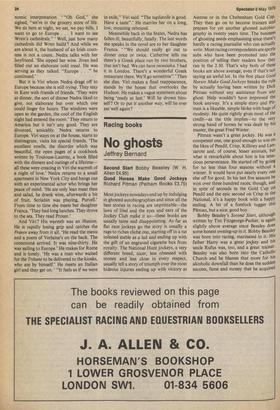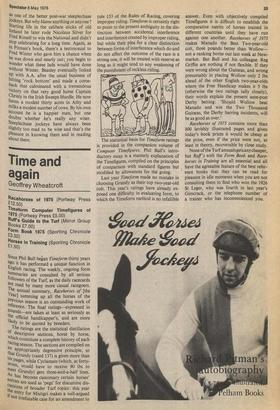Racing books
No ghosts
Jeffrey Bernard Second Start Bobby Beasley (W. H. Allen £4.95)
Good Horses Make Good Jockeys Richard Pitman (Pelham Books £3.75)
Most jockeys nowadays end up by indulging in ghosted autobiographies and since all the best stories in racing are unprintable—the laws of libel and the eyes and ears of the Jockey Club make it so—these books are usually tame and disappointing. As far as flat race jockeys go the story is usually a rags to riches cliché one, starting off in a rat infested stable as a lad and ending up with the gift of an engraved cigarette box from royalty. The National Hunt jockeys, a very different breed, nicer, less obsessed with money and less close in every respect, usually tell a story of triumph over the most hideous injuries ending up with victory at
Aintree or in the Cheltenham Gold COP. They then go on to become trainers and prepare for yet another ghosted autobiography in twenty years time. The business of ghosting needs emphasising since there's hardly a racing journalist who can actually write. Most racing correspondents are sports subs who have been promoted into the position of tellingtheir readers how they ran in the 2.30. That's why both of these books are above average, even if that's not saying an awful lot. In the first place Good Horses Make Good Jockeys breaks the rule by actually having been written by Dick Pitman without any assistance from any ghost. Help wouldn't have improved the book anyway. It's a simple story and pitman is a likeable, simple bloke with bags of modesty. He quite rightly gives most of the credit—as the title implies—to the very strong hand of horses he was dealt by his master, the great Fred Winter.
Pitman wasn't a great jockey. He was a competent one, one good enough to win on the likes of Pendil, Crisp, Killiney and Lanzarote and, of course, lesser animals, but what is remarkable about him is his tenacious perseverance. He started off by going for no less than four seasons without a winner. It would have put nearly every one else off for good. In his last five seasons he won over three hundred races, though, and in spite of seconds in the Gold Cup on Pendil and the epic second on Crisp in the National, it's a happy book with a hapPY ending. A bit of a forelock tugger this Pitman, but a nice, good boy. Bobby Beasley's Second Start, although written by Tim Fitzgeorge-Parker, is again slightly above average since Beasley does some honest owning-up in it. Bobby BeasleY was born into racing, marinated in it. His father Harry was a great jockey and his uncle Rufus was, too, and a great trainer. Beasley was also born into the Catholic Church and he blames that more for his alcoholic downfall than he does the sudden success, fame and money that he acquired aS one of the better post-war steeplechase Jockeys. But why blame anything or anyone? Starting life in the celibate sticks of old Ireland he later rode Nicolaus Silver for Fred RimeII to win the National and didn't stop celebrating for a long time. Again, as in Pitman's book, there's a testimonial to Fred Winter who gave him a chance when he was down and nearly out ; you begin to wonder what these lads would have done Without Winter. Beasley eventually linked UP with A.A. after the usual business of hitting `rock bottom' and made a comeback that culminated with a tremendous victory on that very good horse Captain Christy in the Irish Sweeps Hurdle. He now farms a modest thirty acres in Athy and milks a modest number of cows. By his own account he is a happier man, but one doubts whether he's really any wiser. Steeplechase jockeys have always been Slightly too mad to be wise and that's the Pleasure in knowing them and in reading about them.



































 Previous page
Previous page